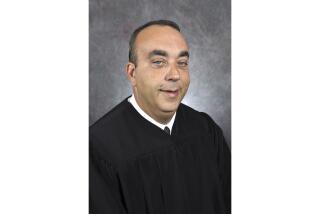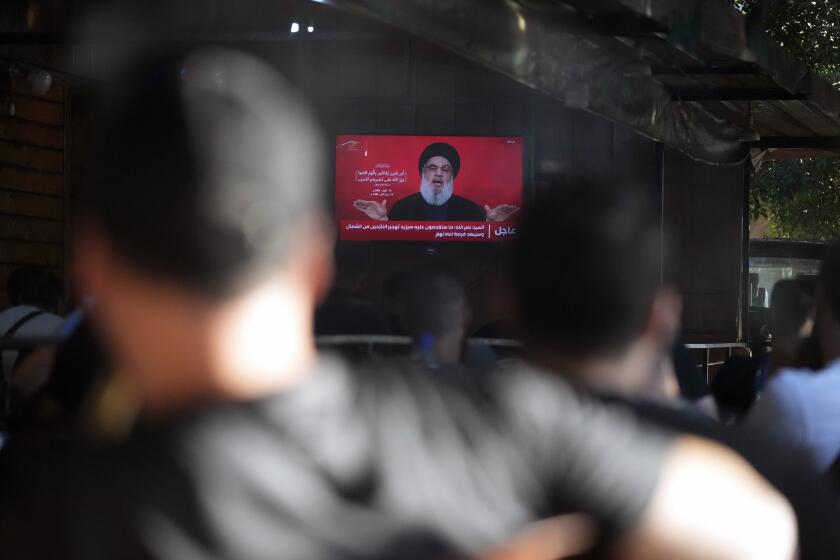Clergy Call for Building of Peace Movement
Flush from antiwar demonstrations that drew millions of participants worldwide, Los Angeles religious leaders and peace activists said Monday they are already looking beyond a possible war with Iraq to building a broad-based peace movement.
Meeting at the USC Religious Center, about 20 priests, ministers, rabbis, Muslim leaders and peace activists said their first priority is to press opposition to a war in Iraq and to support those in the military who may want to conscientiously object.
But the opposition to a war in Iraq, evidenced by massive protests over the weekend in European capitals as well as San Francisco, New York, Los Angeles and other U.S. cities, has encouraged some peace organizers to think about expanding their agenda.
“In order to really advocate for peace you can’t be against just one particular war. You have to look at the big picture and look at what war does to our country, to our society, to our world,” said Father Felix Just, director of the Center for Religion and Spirituality at Loyola-Marymount University.
Participants at Monday’s meeting worked up a shopping list of other causes they hope the antiwar movement will aid, even if those issues have been long championed by various activists. Those include nuclear disarmament, human rights and tying military spending to cutbacks in education and social services such as health care and affordable housing.
“Our work is to think right now before it’s too late about what the next step is and what we’re for, as opposed to what we’re against,” Danielle Babineau, state political director of California Peace Action, said Monday at the meeting sponsored by Pax Christi, the Roman Catholic peace organization.
The keynote speaker, the Most Rev. Thomas J. Gumbleton, Roman Catholic auxiliary bishop of Detroit, spoke at length about weapons of mass destruction, the U.S. nuclear arsenal, and plans he said the Pentagon has to put nuclear weapons in space.
He noted that the Bush administration has withdrawn from the Antiballistic Missile treaty and has asserted that it believes in a first-strike under some circumstances.
“We could lose it all in an afternoon,” Gumbleton said, speaking of the planet and the consequences of nuclear war.
Gumbleton said some U.S. conventional weapons “come close to being weapons of mass destruction,” among them fuel-air burst bombs, the 15,000-pound “daisy cutter” bomb used in Afghanistan, and cluster bomblets. “The only thing they don’t have is the radioactive element,” Gumbleton said.
But parlaying opposition to a war with Iraq into general opposition to nuclear weapons and other changes in domestic and foreign policy will be difficult, Gumbleton admitted.
Claire Gorfinkel, a member of the leadership team of the Interfaith Communities United for Justice and Peace, one of the co-sponsors of Saturday’s Hollywood antiwar rally, said she was committed to nuclear disarmament.
“But my sense is at the moment our challenge is to stop this march toward war in Iraq,” said Gorfinkel, who attended the meeting at USC.
Gumbleton, one of the most liberal bishops in the U.S. Catholic church, said in an interview that he is encouraged by the show of opposition worldwide to a war in Iraq. But he worries about a change in antiwar sentiment if and when President Bush orders U.S. forces into action.
“There is no doubt in my mind that across this country there’s a public refusal to support the war. But I don’t want to see what I am afraid will happen -- once the president says we’re going to go forward [the public will say] now we have to support the president and support our troops. I think that would be a major moral disaster.”
Those at Monday’s conference agreed that the confrontation with Iraq has stirred debate not only within the country but within families.
“People are engaged in a level of discussion at the family dinner table, in the dorm rooms, and certainly in churches, temples, synagogues and mosques at a level that they haven’t been to since the Vietnam War,” said Donald Miller, religion professor and executive director of the Center for Religion and Civic Culture at USC.
He said whether a broadened peace movement agenda is successful will depend, ironically, on the failure of the U.S. and its allies to quickly win the war. If the war is short, Miller said, it will be difficult to sustain opposition. But if the U.S. becomes mired in Iraq and Iraqi and U.S. casualties are high -- something Miller and others said they do not want to see -- the peace movement could grow.
More to Read
Sign up for Essential California
The most important California stories and recommendations in your inbox every morning.
You may occasionally receive promotional content from the Los Angeles Times.










